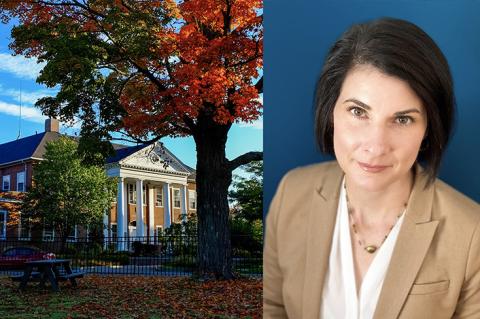Professor Melissa Davis: Providing Representation

Recognizing the demand for appointed counsel for indigent clients charged in criminal cases, UNH Franklin Pierce Associate Professor Melissa Davis began speaking last year with the executive director of the New Hampshire Judicial Council about the need for a program that would support that need.
In 2023, Davis teamed up with Clinical Assistant Professor Julian Jefferson to write a proposal for a nine-month-long criminal defense training program, September to June, for lawyers interested in providing representation to indigent clients who have been charged in criminal cases. Their proposal was approved, and the professors received a grant of nearly $57,000 of federal funds to cover expenses for the program. Currently, there are 11 practicing attorneys enrolled.
“The idea came out of the fact that we have an indigent defense crisis in New Hampshire,” explains Davis, who also serves as director of the Criminal Practice Clinic at UNH Franklin Pierce. “We don’t have enough lawyers to be able to meet all the needs of the people who are waiting to have counsel appointed to them. The question was, ‘How can we develop more lawyers?’”
The traditional path for those wishing to take on the criminal defense of underrepresented clients went through the New Hampshire Public Defender (NHPD). As Davis explains, attorneys had that option or could also contract with the N.H. Judicial Council to acquire those cases.
“But in order to get that contract,” Davis says, “you had to have some amount of experience doing criminal defense work. Our idea was, if we’ve tapped out the number of people who are available or willing to do this, who have experience, maybe we can help provide some experience to others and then have them start working on contract cases.”
The 11 attorneys participating in the initial year of the “criminal defense academy” met for three days in September and will continue to meet once a month until June, when they will gather for another three days for trial skills training. While the diverse group includes some attorneys starting second careers in the legal profession, Coda Campbell, JD ’23, is among several recent graduates of UNH Franklin Pierce who are part of the program.
Campbell, who practices criminal defense with a focus on military cases at Campbell Law in New Hampshire’s Sullivan County, enrolled in the criminal defense academy after learning about the program from Davis and others.
“I know that criminal law is central to a lot of the military cases I’m handling,” says Campbell, who once served as a NHPD summer intern, “so I wanted to find a way to keep a pulse on criminal law and the rules of evidence so I’ll be sharp and prepared for a court martial. As expected, the training has been fantastic. I could not think of two more qualified leaders of the program than Melissa and Julian.”
So far, Campbell has learned about how cases are managed in district and superior court; how to approach the cases of habitual offenders; and about VAWA (Violence Against Women Act) implications, among other areas of criminal law. She credits the training for increasing her comfort level with taking on criminal cases, and her practice has recently shifted to representing mostly indigent clients. For their part, Davis and Jefferson hope the program will continue its contribution to the legal community beyond its inaugural year.
“Having 11 new attorneys willing to take cases is significant, but we still need more,” Davis says. “The Public Defender provides quality representation for their clients, but if they can’t take a case because of a conflict of interest, then we need to make sure those clients are getting an equal level of representation. This program is one piece in trying to help make that happen.”